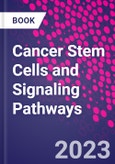Cancer Stem Cells and Signaling Pathways explores the mechanism of cancer stem cell signaling pathways in cancer advancement, serving as an ideal reference guide for investigators with valuable answers to problems associated with anti-cancer treatments and an understanding of the crosstalk among the signaling pathways in CSC regulation. Despite recent advances in tumor therapy and a greater understanding of their biology, tumors continue to be a prevalent and fatal worldwide. According to a novel paradigm in tumor biology, a small percentage of the cells within a tumor known as cancer stem cells (CSCs) are predicted as a crucial population for tumor progression.
Please Note: This is an On Demand product, delivery may take up to 11 working days after payment has been received.
Table of Contents
1. Origin of cancer stem cells (CSCs) and the signalling pathways associated with stem cells and cancer stem cells2. The importance of niche in therapeutic strategies targeting normal and cancer stem cells
3. Cancer stem cell research: A phosphoproteomic approach
4. Role of Mechanotransduction in stem cells and cancer progression
5. Cancer stem cell signaling in neuroblastoma progression- In touch with reality
6. Role of cancer stem cells in developing chemoresistance of solid tumor
7. The cell surface markers and signaling pathways of cancer stem cells: Target for potent Therapeutics
8. Lung cancer stem cells markers and its potential therapeutic molecular targets
9. Role of cancer stem cells in maintenance of tumor heterogeneity in brain tumors
10. Colorectal cancer stem cells: Overview and potential targeted therapy
11. Pancreatic cancer stem cells and inflammation: Milestones achieved and challenges ahead
12. Epigenetic modification: Key regulator of reprogramming in cancer stem cells
13. Regulation of cancer stemness, cell signaling, reactive oxygen species, and microRNAs in cancer stem cells
14. The stem cell niche: Key role on cell therapy in regenerative medicine
15. Controlled and targeted proliferation of stem cells for therapeutic application
16. MicroRNAs as theranostics: Combating breast cancer stem cells
17. Chemical approaches to stem cell and signaling pathways for therapeutics
18. Responsive biomimetic nanocarriers and its role in stem cell-based targeting therapeutics
19. Stem cell signalling in nephroblastoma with reference to Wilms tumor
20. Brain cancer stem cells: Overview and potential targeted therapy
21. Pancreatic cancer and stem cell
22. Epigenetic modulation of cancer stem cells in vitro 3D models
23. Epigenetic signalling: Regulation of cancer stem cells in colorectal cancer
24. Cancer stem cells, signalling pathways and chemopreventive effects of phytochemicals in androgen-regulated cancers
25. Biomarkers and signalling pathways of esophageal cancer stem cells: promising targets to limit the metastatic potential and stemness.
26. miRNA signalling networks of therapeutic interest involved in angiogenesis regulation by cancer stem cells
27. An altered metabolic landscape drives quiescence to the reawakening of cancer stem cells.
28. Canonical WNT signaling pathway in cancer stem cells and potential inhibitors of therapeutic importance
29. A mechanistic view of the role of thyroid cancer stem cells in microenvironment
30. Cancer stem cells and maintenance of tumor heterogeneity/microenvironment
31. An overview of the role of proto-oncogenes in tissue-specific stem cells
32. Components of cancer stem cells microenvironment: Influence on the tumorigenic property and stemness in cancer stem cells.
33. An overview of hepatocellular carcinoma stem cells and potential targeted therapies
34. Cancer stems cell-derived exosomes: What is known to date
35. Signaling mechanisms of chemoresistance in breast cancer stem cells for therapeutics








